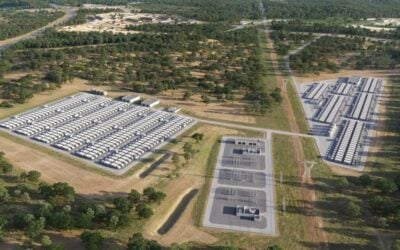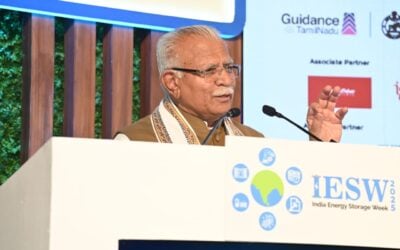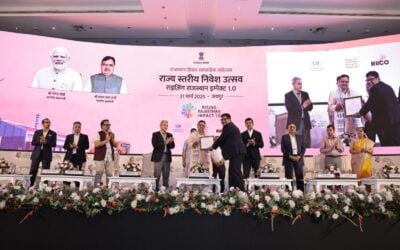ACME’s Ecogrid Battery is used for backup services. Credit: EcoGrid
One of India’s largest solar developers ACME Clean tech Solutions believes that its strong track record in PV installations will set it in good stead to pioneer solar-plus-energy storage solutions across the country, in what it claims is an opportune moment to start pilot projects.
ACME, which has more than 1.5GW of PV installed in India and aims for 7.5GW capacity by 2019, is forecast to overtake Delhi-based Welspun Renewables as the country’s largest solar project developer at some point this year, according to consultancy firm Bridge to India’s ‘India Solar Map 2015’ released last September.
Enjoy 12 months of exclusive analysis
- Regular insight and analysis of the industry’s biggest developments
- In-depth interviews with the industry’s leading figures
- Annual digital subscription to the PV Tech Power journal
- Discounts on Solar Media’s portfolio of events, in-person and virtual
Samir Sharan, chief executive of the ACME group, told Energy Storage News that combining solar and its lithium-ion energy storage systems would help ACME to deliver significantly cheaper costs of electricity, however, the prices would vary from state to state within India.
Sharan said the Indian storage market is evolving and has a long way to go before it matures and can offer the right opportunities.
However, given Indian prime minister Narendra Modi’s target of 100GW of solar capacity by 2022, Sharan added: “This is the right time to initiate the pilot projects and establish results [and] be ready with the solutions offerings.”
Furthermore, while India’s vast solar ambitions have made headlines worldwide this year, industry commentators consistently site grid stability as a major bottleneck to progress, with issues expected to arise in anything from two-to-five years times. This could also bring energy storage up the agenda.
In a recent blog for Energy Storage News, Dr Rahul Walawalkar, founder and executive director of the India Energy Storage Alliance (IESA), also explained how extreme flooding in Southeast India in early December last year had highlighted the need for improved grid resiliency through energy storage and microgrids.
ACME’s MoU to supply European utility
Near the end of last year ACME signed a memorandum of understanding (MoU) with an unnamed European utility in order to supply residential storage solutions for the European grid-tie markets, known as the Price Coupling of Regions (PCR) market.
The next step of the MoU will involve the signing of a letter of interest (LOI), due in February. The plan is to supply the solutions in three stages, starting with 1MWh of pilot projects, followed by 50MWh in the second stage and 100MWh in the third stage.
ACME offers lithium-ion based energy storage systems, known as EcoGrid ESS, which offers backup services for residential, commercial and Industrial users, with an expected operational lifespan of more than 10 years. ACME also claims its lithium-ion based systems are more efficient than existing systems on the market which use standard inverters and lead-acid batteries.
Battery management system (BMS) functions and cell packaging techniques allow ACME to customise its solutions for each customer, said Sharan, who also claims that there are currently no competitors for this kind of technology based in India.
ACME has already installed the storage systems in the residential market, high altitude regions, and buildings based in the water, bio-technology and textile sectors as well as other corporate structures and the telecom industry in India and Africa.
For example, in November the company bagged an order to supply an EcoGrid storage system to Uttarakhand State Biotechnology Department (USBD).
Back in December 2013, French green energy company EDF Energies Nouvelles (EDF EN) and Luxembourg-based EREN acquired a 25% stake each in ACME Solar Energy, which is the solar energy arm of ACME Cleantech Solutions in a INR5.5 billion (US$82 million) deal.
A KPMG report last November, which predicted that solar will cause “major disruption” in India’s energy market over the next decade found that KPMG said the holding back of the rooftop PV market up till now could change with a “significant evolution” expected in storage technologies, which will make self-consumption of solar power generated particularly in residential settings more attractive, as reported by Energy Storage News’ sister site PV Tech.






